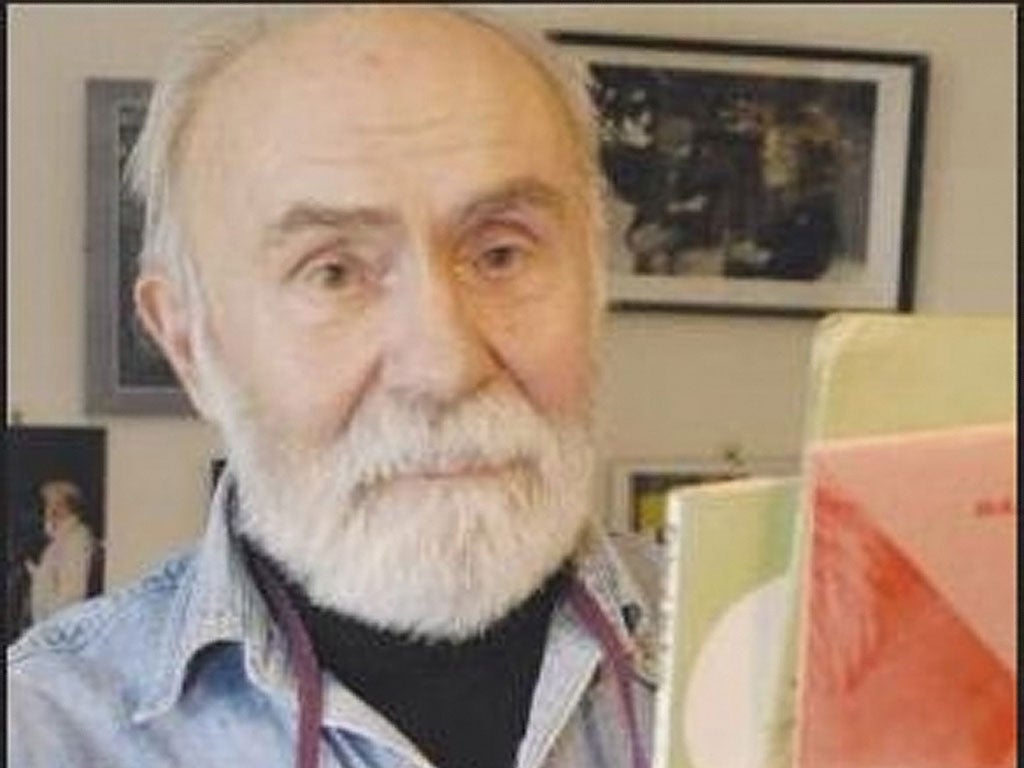
Your support helps us to tell the story
From reproductive rights to climate change to Big Tech, The Independent is on the ground when the story is developing. Whether it's investigating the financials of Elon Musk's pro-Trump PAC or producing our latest documentary, 'The A Word', which shines a light on the American women fighting for reproductive rights, we know how important it is to parse out the facts from the messaging.
At such a critical moment in US history, we need reporters on the ground. Your donation allows us to keep sending journalists to speak to both sides of the story.
The Independent is trusted by Americans across the entire political spectrum. And unlike many other quality news outlets, we choose not to lock Americans out of our reporting and analysis with paywalls. We believe quality journalism should be available to everyone, paid for by those who can afford it.
Your support makes all the difference.Dick McBride was a poet of the Beat Generation who acted as a literary bridge between the United States and Britain, bringing the writings and spirit of the Beats to this country. In books and in performances of his own works and those of fellow writers, he sought to broaden awareness of the poets who had made such an impact on American writing.
McBride was born in Washington, Indiana in 1928 and grew up in Illinois. He studied at Eastern Illinois State College and the Radio Drama Workshop in Milwaukee. After several years travelling in the north-eastern states he arrived in San Francisco in 1953 looking for work, and visited a poet whom he admired, Kenneth Patchen. McBride recalled: "The first man who gave me any kind of modern lit guidance (another world of Giono, Celine, Sailone, Proust, Nathaniel West, even Saroyan and [surprise] Herman Melville…) was Kenneth Patchen and I probably owe him more than I realise."
Patchen introduced him to Lawrence Ferlinghetti, the poet and proprietor of the City Lights bookshop in San Francisco. McBride started work as a clerk on the front desk and managing the book stock. Here he befriended other poets and writers of the Beat Generation, including Jack Kerouac and Allen Ginsberg, whose Howl (1956) was published by City Lights.
McBride's first publication was the controversial poem St Francis (Random thoughts of a Protestant Cop) (1959), printed in the second issue of the mimeograph journal Beatitude. This magazine, which would go on to become an important early outlet for the Beat poets, was printed at the Bread and Wine Mission in San Francisco. The same publisher issued McBride's first collected volume of poetry, Oranges (1960), containing illustratrations by Victor Wong. A year later came Ballads of Blood.
His short story Haircut Dream was published in City Lights Journal (1963). A review in Kulchur magazine said: "Two of the young writers involved with visionary experiences are to be taken more seriously. Richard McBride describes a series of wild dream sequences revolving around the appearance and disappearance of Suzy Wong. Going from alley to alley, through many doors, Haircut Dream is reminiscent of the magic circus in Steppenwolf."
In 1964 he moved to London for six months on an exchange organised by Ferlinghetti. The aim was to introduce Beat authors to British readers and create links between the avant-garde writers of both countries. He based himself at Better Books in Charing Cross Road, run by a former Penguin Editor, Tony Godwin, and sowed the seeds for Ginsberg's visit the following year.
This visit in turn led to the International Poetry Incarnation of June 1965, organised by Michael Horovitz and Barry Miles, when 7,000 people filled the Albert Hall. The influence of this "happening" on the nascent counterculture was immense. As the poet Jeff Nuttall commented, "the Underground was suddenly there on the surface".
By 1967 City Lights publishing had outgrown the bookstore and moved to San Francisco's Grant Avenue. It was run by McBride, with his brother Bob McBride and Martin Broadley. Two years later McBride moved to Great Horwood in Buckinghamshire, where he imported City Lights and other US counterculture books into the UK. After living in Australia for a time, in 1988 he settled in Colwall, near Malvern, in Herefordshire.
In recent years he republished a memoir on Ginsberg, Cometh with Clouds (1982/2011), and worked with the experimental music group Celluloid on a project called The Last Beat. His final collection of poems is Remembered America (2004), of which the poet Philip Callow said: "I have long admired his energy and his stubbornly hopeful vision against all the odds… In general I am gladdened by writing that can be wild like Ginsberg and is never far from ecstasy."
Here is the poem "Woman is a River" from that volume: "Woman is a river / Rampant through / Bending trees / Soft / Crooning / Roaring with / Rage through / Ages / Of curves / Smooth lines of cloudy / Mirrors blossoming / In flowering flood / Go with the flow / Flow with the glow / The ebb tide / Coming, rides rollercoasters / To round out the / Morning, as the sun / Shines on the debris / Of resistance."
Marcus Williamson
Richard William McBride, poet and writer: born Washington, Indiana 8 May 1928; married 1953 Betty (two sons), secondly Jacqui (died 1996); died Colwall, Herefordshire 28 August 2012.
Join our commenting forum
Join thought-provoking conversations, follow other Independent readers and see their replies
Comments